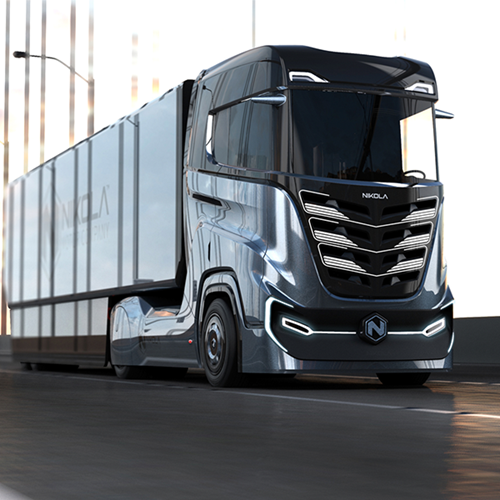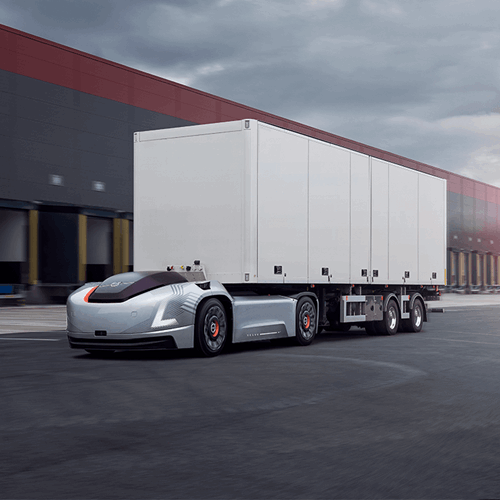The truck driver shortage is causing problems for freight companies and many other commercial enterprises. This is because around 67,000 drivers retire every year in Germany and are then replaced by only around 27,000 new drivers. It is not just the working conditions that are behind this trend. The threat scenarios resulting from the technological progress in autonomous driving that is already apparent today present a much bigger issue. These are scenarios in which electric trucks navigate freeways autonomously, meaning that today’s truck drivers could become surplus to requirements. It is worth getting a change of perspective here, because the perceived threat holds numerous opportunities for professional development, which simply has to move with the times.
Today’s driver is tomorrow’s manager
Self-driving cars or trucks will not be introduced overnight. Instead, they will go through the different stages more or less rapidly, from the assisted or partially automated driving that is already fairly common today to highly or fully automated driving, right through to fully autonomous driving. The introduction of a 5G network will lay the foundations in terms of infrastructure initially for the automated driving of trucks on freeways and eventually for fully autonomous driving. However, there is also a wide range of activities that will continue to require a truck driver. Or, more specifically, a truck and transport manager – which could very well be the name of the profession. One aspect of the “TT manager’s” duties will then be to operate the on-board computer, as well as taking responsibility for monitoring and safety. Despite autonomous driving, another aspect will include having to “pitch in” as before, namely in all instances of loading, securing the freight and vehicle maintenance. And, in case of doubt, the TT manager will also serve as a driver on the narrow streets of big cities.
New solutions – new skills
The variety and novel nature of the tasks undertaken by this kind of truck or transport manager will increasingly demand different skills. Alongside an understanding of electric drive systems, the TT manager will also need basic knowledge of information technology. Modern software will increase the TT manager’s involvement in the information, communication and organizational processes along the entire logistics value chain, especially if the loading and unloading processes at the ramps are also fully digitalized. The TT manager’s area of responsibility will extend to include an increasing focus on monitoring and surveillance functions, with equipment resembling that used by colleagues based at the fleet management center. The only difference will be that the TT manager’s office will whoosh quietly along the freeways. It is a little like what coachmen on horse-drawn carriages experienced when the first trucks with internal combustion engines started to appear. Instead of knowing how to harness horses and grease a tongue, the first truck drivers had to learn how to double-declutch and change a V-belt. Meanwhile, their fundamental task remained the same – namely to move goods from A to B.
You can get am idea of a TT manager’s new area of responsibility by thinking about how freeway-based deliveries might function in the future. This is why Continental is working with Knorr-Bremse AG on the Highway Pilot concept. Its development stage is intended to yield a solution for automated convoy driving, also known as platooning. Platooning means that trucks form convoys and are then coordinated in fully automated fashion by the vehicle at the front. The Highway Pilot will then enable trucks to join together with other vehicles to form such a platoon. It is a concept that is also likely to rely on human supervision.
Start training truck drivers today
The future of the sector is therefore to be found not only in the digital interconnectivity of trucks with the entire goods transport ecosystem, but also in the successful integration of the human factor. To keep up with this development, shipping companies would be well advised to train their drivers and potential newcomers in the basic technologies of modern fleet management. The VDO Academy is one particularly suitable platform for this. It already has numerous training measures on offer, including how to use digital tachographs and state-of-the-art communication solutions. The range of courses will develop alongside the progressive technological development of autonomous heavy goods traffic and the needs of shipping companies. Thanks to VDO’s close links to the Continental Group, it should be possible in the future to ensure that the latest technological developments are anticipated in advance and made available in the form of training opportunities. After all, Continental is one of the pioneers in the field of autonomous driving.
Even though the romantic notion of the trucker has long been consigned to the past and a comeback is out of the question, the future of truck drivers is certain. They will continue to be an indispensable part of the future logistics industry – Continental’s pioneering development work attests to that. So, the more active the response from shipping companies to the changing professions of tomorrow in terms of offering attractive prospects, the more successful they will be in recruiting the talent required today.








